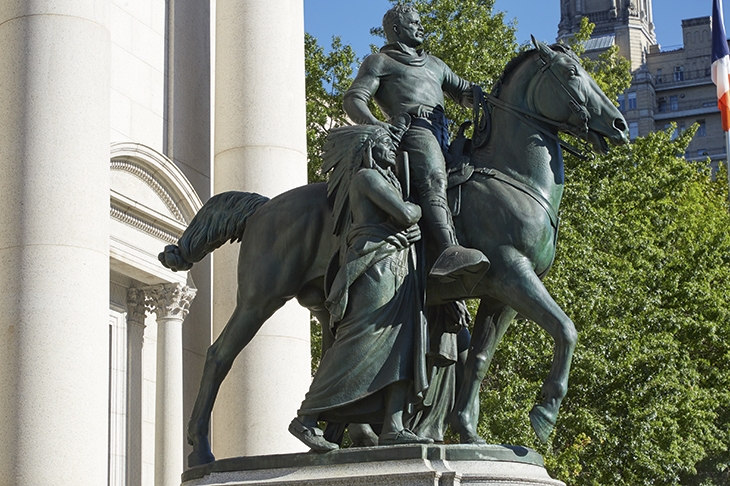Where other nations disbanded their empires following the second world war, America’s underwent transubstantiation, from something solid to something more ethereal. It became a shorthand, connoting an amorphous global entity and its quasi-imperial depredations: commercial infiltration, cultural indoctrination, fomenting coups, waging war. Suitably, this construct (Coca-Cola and cruise missiles) acquired a ‘logo’, writes Daniel Immerwahr — the silhouette of the continental United States sitting athwart the northern half of the Western hemisphere, as iconic as Nike’s swoosh; on the map at least, minding its own business.
Yet what about America’s actual extraterritorial holdings — slighted not only in the concept of US imperium but conventional accounts of American history? In How to Hide an Empire, Immerwahr chronicles the history of these ‘large colonies and pinprick islands’. The result is a whimsical-serious work: a deft disquisition on America, and America in the world, with a raconteur’s touch and keen sense of the absurd.
US empire-building was nothing if not streamlined. The Philippines, Puerto Rico and Guam — a vestigial rump of Spain’s once-sprawling empire — were loot from the 1898 Spanish-American war, with Hawaii, American Samoa and Wake Island claimed shortly thereafter. And much of this insta-empire was, in Immerwahr’s telling, the work of one man of manifest destiny: Theodore Roosevelt, the then-assistant secretary of the Navy who, in a fit of insubordination and agency, unilaterally engineered mobilisation against Spain — forcing a reluctant President McKinley’s hand — and then stormed the Spaniards in the field with his Rough Riders.
The acquisitions recast national consciousness. References to ‘America’, uncoupled from ‘the United States’, entered discourse; there was a boomlet in maps of ‘the Greater United States’. But they were also an aberration. Imperialism is complicit in America’s original sins: purloining land from Native Americans; the chatteldom of African Americans; and much of the Western US having been appropriated from Mexico. But annexation outside the ‘contiguous’ US was inimical to the ethos of a nation birthed in anticolonial uprising, Immerwahr writes.
Moreover, a bountiful homeland obviated any economic need for overseas expansionism. And it didn’t help that the Philippines devolved into the original ‘quagmire’ — protracted insurgency replete with premature mission-accomplished proclamations.
Even before imperialism got a bad rap, America’s empire was a rather shame-faced affair, comprising not so much a commonwealth as a gallimaufry of territories existing in sundry, often anomalous, relationships to the mother country and marked by shifty officialese — Puerto Rico was at one point deemed ‘appurtenant thereto’. Record-keeping was dilatory (officials claimed three islands in 1935, only to find they already held them) and administration roiled by churn — Guam went through 40 governors in little over as many years. The Raj this was not. To corral dealings into one office Franklin Roosevelt tapped the Anti-Imperialist League’s Ernest Gruening, with whom he had the following exchange:
Gruening: ‘This new division is really the equivalent of the British colonial office, isn’t it, Mr President?’
Roosevelt: ‘I suppose it is.’
Gruening: ‘Well, a democracy shouldn’t have any colonies.’
Roosevelt: ‘I think you’re right. Let’s see what you can develop.’
But the second world war thrust America into a global role as the economic engine of the Allied war effort, suggesting a new model of empire. Supply lines traversing multiple theatres formed the basis for a ‘pointillist empire’, a constellation of islands, beachheads and other toeholds, repurposed as way-stations, listening posts, stash-pads and testing grounds.
The impression this leaves is of a vast, transnational corporation whose outposts, like semi-autonomous subsidiaries, permitted off-balance-sheet transactions — atoll arms testing, Puerto Rican women as guinea pigs for the pill, American Samoans leading military enlistment (but unable to vote in presidential elections) — that the brass didn’t want on the main ledger. The upshot: a nuclear arsenal, sexual liberation and ample fighting corps with minimal domestic friction.
But with 800 military bases alone, friction would be felt somewhere. Some of the sparks caught fire in a good way. Immerwahr characterises Burtonwood air force base in its proximity to Liverpool as a fecund ‘borderlands’, spawning the1960s ‘Merseybeat’ scene. And postwar US occupation spurred Japan’s consumer electronics revolution. Yet there was ambivalence. John Lennon groused about US bases in Britain; Sony’s co-founder Akio Morita came to castigate America and advocate a more assertive Japan. Also riven by ‘participation and protest’ were the Bin Ladens: dad was enriched by construction contracts with the US military in Saudi Arabia while his scion moved to avenge the presence of the infidel among the ummah.
A result of 9/11, of course, was the US-led invasion of Iraq. Here, the logistical prowess of the networked empire — its nodes pulsing like a circuit board — wrought shock and awe. But that squeamishness about colonialism fumbled the aftermath. US forces holed up in Baghdad’s Green Zone. ‘In the Red Zone outside, the city was collapsing,’ Immerwahr writes. ‘Inside, service members enjoyed air-conditioning, pools, gyms, bars and the sounds of Freedom Radio.’





Comments